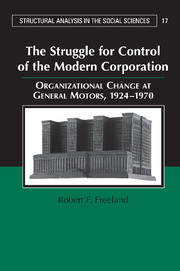Crossref Citations
This Book has been
cited by the following publications. This list is generated based on data provided by Crossref.
Englander, Ernie
and
Kaufman, Allen
2003.
Managerial Fiduciary Duty and Social Responsibility: The Changing Nature of Corporate Governance in Post-War America.
SSRN Electronic Journal ,
Whittington, Richard
2003.
The Work of Strategizing and Organizing: For a Practice Perspective.
Strategic Organization,
Vol. 1,
Issue. 1,
p.
117.
Lincoln, James R.
and
Gerlach, Michael L.
2004.
Japan's Network Economy.
Whittington, Richard
2006.
Completing the Practice Turn in Strategy Research.
Organization Studies,
Vol. 27,
Issue. 5,
p.
613.
Granovetter, Mark
2006.
L'influence de la structure sociale sur les activités économiques.
Sociologies pratiques,
Vol. n° 13,
Issue. 2,
p.
9.
van Baalen, Peter
and
Brunninge, Olof
2009.
Using history in organizations.
Journal of Organizational Change Management,
Vol. 22,
Issue. 1,
p.
8.
Kipping, Matthias
and
Westerhuis, Gerarda
2014.
The managerialization of banking: from blueprint to reality.
Management & Organizational History,
Vol. 9,
Issue. 4,
p.
374.
Karsten, Luchien
2014.
Time as a periodization of management practices.
Management & Organizational History,
Vol. 9,
Issue. 4,
p.
414.
Edwards, Roy
and
Gandy, Anthony
2014.
Navigating the M-Form: Product Scope Review and the development of the General Electric Computer Department.
Business History,
Vol. 56,
Issue. 8,
p.
1361.
Pozzi, Daniele
2014.
An elastic managerial revolution: Family, managers and multidivisional organisation at Pirelli (1943–56).
Business History,
Vol. 56,
Issue. 5,
p.
765.
Ermakoff, Ivan
2014.
Exceptional Cases: Epistemic Contributions and Normative Expectations.
European Journal of Sociology,
Vol. 55,
Issue. 2,
p.
223.
de Jong, Abe
Higgins, David Michael
and
van Driel, Hugo
2015.
Towards a new business history?.
Business History,
Vol. 57,
Issue. 1,
p.
5.
2017.
Developing Holistic Leadership.
p.
287.
Li, Yuan
2017.
A Semiotic Theory of Institutionalization.
Academy of Management Review,
Vol. 42,
Issue. 3,
p.
520.
Foureault, Fabien
2017.
Enrôler les dirigeants pour contrôler l’entreprise : le répertoire d’action des fonds d’investissement.
Revue de la régulation,
2024.
À la recherche de la décision.
p.
235.





